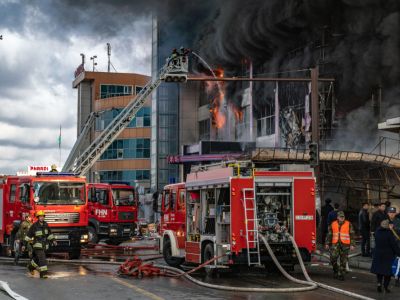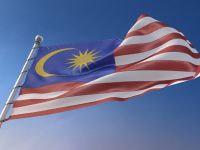Against the backdrop of a declared war against the suspected terrorist, Osama bin Laden, for masterminding horrific attacks on the US last week, claims surfaced that the man possesses or have tried to acquire mass destruction weapons.
US officials said they have more evidence that a number of would-be terrorists still remain in the US and may be trying to acquire biological weapons, CNN reported Tuesday.
Many experts believe the United States is not fully prepared to deal with such an assault, it said.
Experts say the most likely biological killer which terrorists might use is anthrax.
Only 1 billionth of a gram -- the size of a speck of dust -- is lethal.
Agents made from anthrax first produce fever and stomach pains. A horrible death can occur within 24 to 36 hours of the onset of severe symptoms.
"It is spread -- let's say in a biological terrorism event -- it would go by aerosol. You dry it and spread it as a spray and let it drift over a long way," said D. A. Henderson, the director of the Center for Civilian Biodefense Studies at Johns Hopkins University.
Still more terrifying, although much harder for terrorists to get their hands on, is the smallpox virus, a disease declared eradicated worldwide in 1980.
"To be able to move smallpox simply means to have a device within a writing ink pen that could very easily pass any customs officer, could easily pass through a metal detector, and you could have enough smallpox in there to start the world's worst epidemic," Michael Osterholm, the director of the Minnesota Center for Infectious Disease, told the network.
Smallpox spreads like wildfire.
It is estimated to have killed a 120 million people in the 20th century.
During the Cold War, sources say the Soviet Union developed smallpox and anthrax weapons that could be lobbed into the United States on intercontinental missiles.
The Russians insist they only have biological agents for vaccine research. A defector said that is not true and that the weapons could end up in the wrong hands.
"In my opinion, it's a clear and present danger," said former Soviet weapons expert Ken Alibek.
"At this point, we're woefully short in vaccines and antibiotics," Osterholm told Reuters.
"The [US] public health infrastructure is but a shell of what it needs to be able to respond. And public health has continued to be overlooked in most of the kinds of funding that have occurred to date, in terms of trying to prepare us for terrorism."
Still, barring leakage from Russia, or help from Iraq, Osama bin Laden and his al Qaeda network would have difficulty getting their hands on a biological weapon, said Jonathan Tucker, author of a new book titled "Scourge: The Once and Future Threat of Smallpox.
"We should improve our intelligence about what terrorists are doing in this area, but we shouldn't panic," said Tucker.
"I think the threat is quite small."
The threat is small because biological agents are so hard to produce and hard to make into weapons, according to the network.
By contrast, the threat of a chemical attack may be greater. But the United States is relatively well prepared against such an event, it said.
As the sarin gas attack in the Tokyo subway showed six years ago, chemical agents can affect only a limited area.
According to CNN, if US troops were to head into Afghanistan, though, going after bin Laden and his group, experts say the troops would need chemical protection.
Citing newspaper reports, CNN said that satellite pictures of training camps outside Jalalabad in Afghanistan show dead animals on test ranges, which suggests militants there may have been experimenting with various poisons.
REPORT: BIN LADEN TRIED TO BUY URANIUM FROM BULGARIAN ATOMOIC PLANT
A report by the Bulgarian press agency (BTA) said on Tuesday that bin Laden tried to buy uranium from a Bulgarian atomic power plant this year.
This is London.com quoted the report as saying that businessman Ivan Ivanov met bin Laden in mid-April at a religious festival close to the Pakistani city Peshawar, where the latter voiced his interest in the nuclear waste from the atomic power plant in Kosloduj.
The Bulgarian, who had been working in one of bin Laden's companies confirmed that the Saudi billionaire had been particularly interested in uranium 235 which is used as a fuel for nuclear plants and can be adapted for use in nuclear weapons, said BAT.
Ivanov was among staff from Egypt, Syria, Yemen, Europe and the US working for a bin Laden-owned firm making water purification plants who had been invited to the Pakistan festival, said the report.
The director of the nuclear plant, Jordan Jordanov, said security measures in Kosloduj had been tightened after the terrorist attacks last Tuesday.
According to This is London.com, BAT’s report is not the first to reveal bin Laden's quest for nuclear components.
After the 1988 Sudanese and Kenyan US embassy outrages, which killed 244 people, a former associate testified during the bombers' trial in New York this year that he knew of a similar transaction.
Jamal Ahmed Al-Fadl told the court he had once attempted to purchase uranium for bin Laden, reported the news service.
Al-Fadl, a 37-year-old from Sudan, has been a top source to those investigating bin Laden's activities for five years, since his alleged split with the Saudi exile over money.
He described a 1994 effort to buy uranium for al Qaeda for $1.5 million. He said the uranium came in a two to three-foot cylinder with engravings indicating the source as South Africa, reported the news service, adding that whether the transaction was completed was left unanswered – Albawaba.com
© 2001 Al Bawaba (www.albawaba.com)









